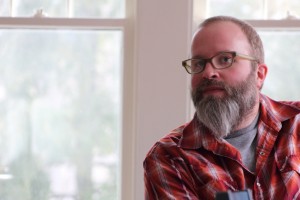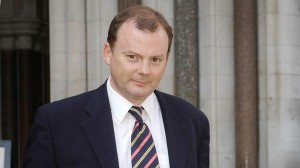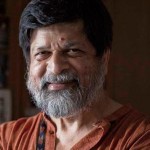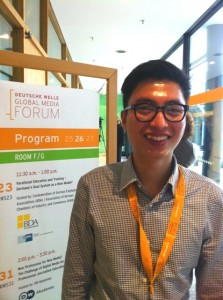Search Results for Tag: new media
Dan Sinker: ‘Journalism’s future is on the open web’
New media is pushing the boundaries of journalism by introducing new technologies. But the question is how newsrooms and journalists can innovate without having to dive into the programming world themselves. This is where the Knight-Mozilla Fellows come in.
The Knight Foundation has long supported quality journalism and journalistic innovation. In 2012, they teamed up with the Mozilla Foundation, which actively promotes an open internet and open source software. The two created the OpenNews partnership with the idea of bringing journalism and technology together.
In 2013, Knight-Mozilla Fellows are hacking newsrooms at the prestigious media organizations such as the New York Times, the BBC, the Guardian, Zeit Online, Spiegel Online, the Boston Globe, ProPublica and La Nacion.
DW Akademie’s Steffen Leidel met with the head of the Knight-Mozilla OpenNews project, Dan Sinker. They talked about why hackers are interested in working with journalists in the first place, how journalists can tap into the world-wide community of hackers and a revolutionary new piece of software for data scraping.
![]() read more
read more
Richard Sambrook: ‘The values of traditional journalism still matter’
After years of hype surrounding the rise of social media and the Internet as alternative sources of news and information, a growing number of voices are warning that traditional journalistic standards of objectivity and impartiality are still necessary even in the digital age. One of them is journalism professor and former head of BBC news Richard Sambrook.
In a recent study, Sambrook (@sambrook) writes of serious concerns about the quality and practices of news media. While acknowledging that it is difficult to enforce professional standards in the digital age, he concluded it would be “dangerous” to “disregard such standards”. DW Akademie’s Steffen Leidel discussed these issues and more with Richard Sambrook.
![]() read more
read more
What makes a person digitally literate?
Bangladeshi new media pioneer Shahidul Alam tells DW Akademie about the skills and tools that make a person digitally literate. In this interview, he talks about the way to improve digital literacy in Bangladesh and the meaning of more internet access in the country.
UNESCO has defined digital literacy as “the ability to understand and use information in multiple formats from a wide range of sources when it is presented via computers”. With the emergence of social networking, digital literacy has become a major factor in enabling people to raise their voices, communicate, collaborate and pursue wide-scale social and political reforms.
People begin to think digitally when material things are not the only measurable items, Shahidul Alam says. As a promoter of new media, he helped introduce email to Bangladesh in 1994 and set up the first web portal in the country. Alam is also a founding member and advisor in the LEARN Foundation, which is dedicated to information and communication technology (ICT) training in rural regions.Watch the video interview and find out more:
![]() read more
read more
Young Vietnamese benefits from studying in Germany
At this year’s Deutsche Welle Global Media Forum, we met up with Danh-Quy Nguyen, a Vietnamese who studied in Germany and now works as the Deputy Managing Editor for ELLE Vietnam. A few years ago, Danh-Quy was one of the first to receive a scholarship for the two-year Master’s program “International Media Studies” at DW Akademie.
You graduated from DW’s International Media Studies program last year. Now, you’ve been invited back as a guest and expert for a panel-discussion at the DW Global Media Forum. How does that make you feel?
Firstly, I feel great and honored to be invited by my teachers and colleagues. I think it’s an experience that not everyone can have. So I feel very happy. Secondly, I’m also very happy to see my old friends and many colleagues from Deutsche Welle.
What do you miss most about Germany?
What I miss most from Germany is lots of trees, lots of green and the Rhine River.
Can you apply the knowledge that you learned at DW to your work in Vietnam?
Of course! I learned a lot at DW and I use it in my work every day. The most important thing I learned from the DW Master’s program is how to communicate with people from different countries and different cultures. This is very important for my daily job. As Managing Editor, I have to communicate with different editors and people from the fashion industry all around the world.
![]() read more
read more
#ugandavotes – the impact of social media in reporting elections
.jpg)
Facebook and Twitter are well established tools of the trade for many journalists but less so in countries such as Uganda. However, the recent elections may well have changed that. In a guest blog post, Ruth Aine a journalist from the Radio station Power FM in Kampala, describes the rise of social media during Uganda's recent elections.
![]() read more
read more








Feedback